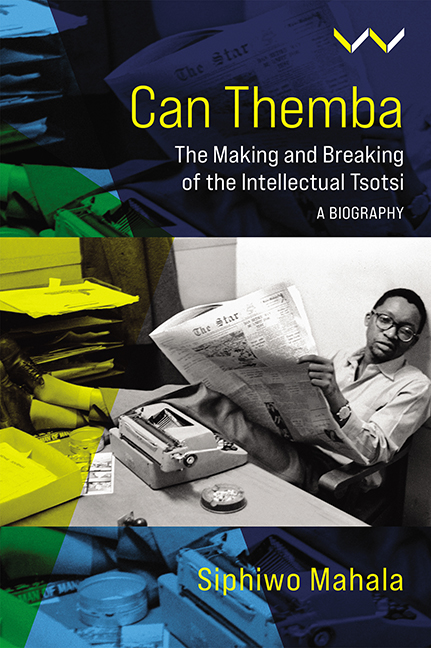Book contents
- Frontmatter
- Dedication
- Epigraph
- Contents
- List of Illustrations
- Acknowledgements
- Introduction
- PART I Death and Birth of a Scribe
- PART II ‘Live Fast and Die Young’
- PART III The ‘Intellectual Tsotsi’
- PART IV Dances with Texts: Writing and Storytelling
- PART V A Writer’s Immortality
- Postscript: The Three Burials of Can Themba
- Notes
- Bibliography
- Index
16 - Re-Membering the Fragments
Published online by Cambridge University Press: 26 May 2022
- Frontmatter
- Dedication
- Epigraph
- Contents
- List of Illustrations
- Acknowledgements
- Introduction
- PART I Death and Birth of a Scribe
- PART II ‘Live Fast and Die Young’
- PART III The ‘Intellectual Tsotsi’
- PART IV Dances with Texts: Writing and Storytelling
- PART V A Writer’s Immortality
- Postscript: The Three Burials of Can Themba
- Notes
- Bibliography
- Index
Summary
I see him [Can Themba] as a living ancestor. That’s why I don't memorialise him as if he didn't have a background.I find it difficult to see him as if he's gone.
Mothobi Mutloatse — Interview (2013)The above epigraph speaks of the transcendent ability of art to Survive beyond the lifetime of its creator. More than fifty years after his passing, Can Themba's works are not only alive and well; they have the potential and vigour to remain part of the public discourse for the foreseeable future.
At the time of his passing in 1967, Themba had been banned for about a year by the South African government. This effectively meant that he was an illegal writer. In this way, the government hit him where it hurt the most – making it impossible for him to practise his innate vocation. Although Themba's articles and short stories had been featured in newspapers, magazines and journals all over the world, he had not yet completed a book. Not only was it his intention to write a book while in Swaziland, according to his wife, he also had intricate discussions with Casey Motsisi about collaborating in writing a short story collection.
But banning meant he could neither be published nor quoted in South Africa, which probably discouraged him from writing, as the chances of being published were greatly diminished. This also erased any hope of earning royalties, as had been his dream since his first interview with Henry Nxumalo in 1952, in which he shared that he wanted to be a famous author one day. Until his work could be legally circulated – which, as described below, did not occur until decades after his death – he could not publish a book or indeed any other writing.
Themba was not the only one silenced by apartheid legislation. According to Mbulelo Mzamane in his introduction to Hungry Flames and Other Black South African Short Stories, Themba was one of 46 writers and social activists banned under the Suppression of Communism Amendment Act of 1965: ‘Between 1960 and 1966, the government made a desperate bid to wipe out the literary achievements of the preceding decades. A Government Gazette of 1966 named 46 exiles as “Statutory Communists” – among them Abrahams, Mphahlele, Modisane, Themba, Maimane and La Guma, all of whom could neither be read nor quoted in South Africa.’
- Type
- Chapter
- Information
- Can ThembaThe Making and Breaking of the Intellectual Tsotsi, a Biography, pp. 203 - 216Publisher: Wits University PressPrint publication year: 2022



